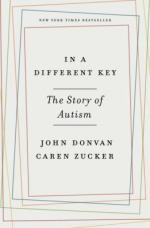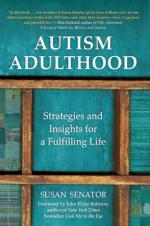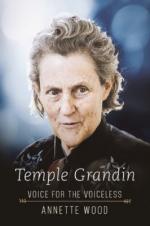April 16, 2017 | sobczakd
"Nearly seventy-five years ago, Donald Triplett of Forest, Mississippi became the first child diagnosed with autism. Beginning with his family's odyssey, In a Different Key tells the extraordinary story of this often misunderstood condition, and of the civil rights battles waged by the families of those who have it. Unfolding over decades, it is a beautifully rendered history of ordinary people determined to secure a place in the world for those with autism--by liberating children from dank institutions, campaigning for their right to go to school, challenging expert opinion on what it means to have autism, and persuading society to accept those who are different. It is the story of women like Ruth Sullivan, who rebelled against a medical establishment that blamed cold and rejecting "refrigerator mothers" for causing autism; and of fathers who pushed scientists to dig harder for treatments. Many others played starring roles too: doctors like Leo Kanner, who pioneered our understanding of autism; lawyers like Tom Gilhool, who took the families' battle for education to the courtroom; scientists who sparred over how to treat autism; and those with autism, like Temple Grandin, Alex Plank, and Ari Ne'eman, who explained their inner worlds and championed the philosophy of neurodiversity. This is also a story of fierce controversies--from the question of whether there is truly an autism "epidemic," and whether vaccines played a part in it; to scandals involving "facilitated communication," one of many treatments that have proved to be blind alleys; to stark disagreements about whether scientists should pursue a cure for autism. There are dark turns too: we learn about experimenters feeding LSD to children with autism, or shocking them with electricity to change their behavior; and the authors reveal compelling evidence that Hans Asperger, discoverer of the syndrome named after him, participated in the Nazi program that consigned disabled children to death. By turns intimate and panoramic, In a Different Key takes us on a journey from an era when families were shamed and children were condemned to institutions to one in which a cadre of people with autism push not simply for inclusion, but for a new understanding of autism: as difference rather than disability"--.
Senator (Making Peace with Autism) hits the nail on the head once again with this work that shares her continuing journey as the parent of an adult with autism. Parents often worry about who will care for their children should they no longer be able, but that concern lessens once children are grown and out on their own. Parents of children with autism, however, must address their fears and seek answers to such a scenario before and into their child's adulthood. Senator tells her experience helping her son, Nat, find a living situation that will support his needs and allow him to be a part of the community. She also relates stories of 30 other families, and the solutions they have found for their children with autism. By explaining how she and others in similar situations manage on a daily basis, the author encourages parents to seek new resolutions in addition to available options for their child.
In this fascinating biography, Annette Wood delves deep into Grandin's life from childhood to adulthood. Wood tells of the trials and tribulations of the icon: What difficulties Grandin struggled with and how she's become a hero for the autistic community. She also tells what Temple has done since the movie came out, where she is today, what kind of difference she's made, and what her future holds. For the 22 million people worldwide afflicted by autism and the countless friends and family members who support them, this brilliant portrait presents an up-close look at the disorder and renewed hope for what the future could bring for those on all levels of the spectrum. -- Amazon.com.
"A scientifically developed program for feeding kids with special needs--based on the popular Brain Balance Program Dr. Robert Melillo's Brain Balance program has helped thousands of families across the country, offering a drug-free, scientifically based method for addressing a wide range of conditions, including autism spectrum disorders and ADHD. In this new book, he presents the nutritional side of the Brain Balance Program, featuring guidelines, tips, and kid-friendly recipes based on the latest scientific research on how food affects the brain. Designed to help busy parents feed picky kids in a beneficial way, the book will show readers how to: Recognize the difference between a fussy eater and a problem eater. Ease the sensory issues that make for mealtime mayhem. Identify food sensitivities using a simple elimination diet. Choose supplements that will help ensure adequate daily amounts of the specific vitamins and minerals important to brain health. Prepare delicious, healthy meals that will pass the taste test of even the most finicky eaters. Understand how the brain plays a primary role in many dietary and nutritional issue including food sensitivities"--.
"When John Elder Robison published Look Me in the Eye, his darkly funny bestselling memoir about growing up with Asperger's Syndrome, he was launched into international prominence as an autism expert. But in spite of his success, he still struggled to decode the secret language of social interactions, and often felt like a misfit who understood car engines better than people. So when a group of Harvard neuroscientists told John about TMS (Transcranial Magnetic Stimulation), an experimental brain therapy that promised to remediate the disabilities of autism and unlock his emotional intelligence, he jumped at the chance to join their study. Switched On recounts the adventure that followed, as John became a guinea pig to the world's top brain researchers in an effort to understand the social and emotional deficits that lie at the heart of autism, with electrifying results. As Robison describes his transformation: "For the first time in my life, I learned what it was like to truly 'know' other people's feelings. It was as if I'd been experiencing the world in black and white all my life, and suddenly I could see everything--and particularly other people--in brilliant beautiful color.""--.
Each year, more than 50,000 U.S. families receive an autism diagnosis. On top of turmoil and worry, they share the same urgent question: What can we do to help our child? The answers parents find can be contradictory... even dangerous. The conventional approach (employed by too many pediatricians) is to medicate difficult behaviors into submission-suppressing symptoms while leaving underlying health challenges untouched. Surfing the Internet for alternatives just leads to confusion. Now, Dr. Janet Lintala, founder of the Autism Health center and an autism mom herself, shares the natural protocols used in her practiceto dramatically improve the function and well-being of children on the spectrum.
"Ron Fournier, bestselling author, editor of the National Journal, and former head of the Associated Press's Washington Bureau, writes movingly of the outsized and crushing expectations that come from parents and with parenting today, through the lens of his relationship with his son, Tyler, who has mild Asperger's"--.
A coming-of-age story about a boy and his family who overcame great challenges by turning Disney animated movies into a language to express love, loss, kinship, and brotherhood.







